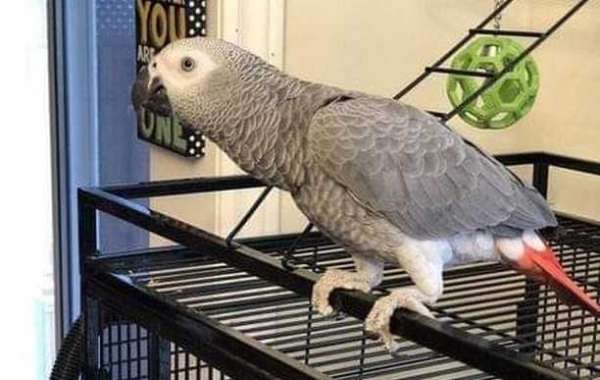African Greys are well-known mimics and talkers, perfectly reproducing household sounds such as the ringing of the phone or the sound of the microwave. They also have a large vocabulary and mimic human voices to the point where they can identify the person they're talking to.
Breeding
 The African grey is an extremely intelligent bird, and is one of the most talkative parrots. They can also be taught tricks and other skills. They are social birds with distinctive personality. They also possess strong emotional and empathic reactions. This is why these birds tend to form strong bonds with a single person and can be demanding of their attention. They can be destructive and can bite, pluck or even inflict self-mutilation.
The African grey is an extremely intelligent bird, and is one of the most talkative parrots. They can also be taught tricks and other skills. They are social birds with distinctive personality. They also possess strong emotional and empathic reactions. This is why these birds tend to form strong bonds with a single person and can be demanding of their attention. They can be destructive and can bite, pluck or even inflict self-mutilation.In the wild, African greys form strong pairs. This pattern of behavior is usually observed in captivity. They can tolerate other members of their family, but frequently become bonded to one member. Despite this, these aren't the most cuddly birds. They are prone to feather plucking and can hurt or bite members of their families who do not spend enough time with them.
They require a large cage, and it should be put in a location that is free of drafts and well-lit. A large playpen is also a good idea, as this allows the bird to spread its wings whenever it feels the need to. The cage should be filled with toys like parrot swings, chains, bells, climbing ropes and birds toys that break. These toys can be utilized to stimulate and strengthen the timneh's mental abilities.
They are very talkative birds and can pick up words and sounds quickly. They are even able to accurately imitate human voices, and in certain cases, discern the person they're speaking to. They have been known to "blow the whistle" on cheating spouses, by repeatedly calling their names out and using the spouse's voice.
In their natural habitat, these birds graze on the tops of trees in search of seeds, nuts, fruit and vegetables. Their diet in captivity must include an assortment of high-quality parrot pellets, sprouts vegetables, nuts, grains and commercially formulated parrot food. The seeds should not be used to make up a large part of the diet of the parrot since they are high in fat and are deficient of vitamins and minerals.
You can also read about how to take care of yourself.
African grey parrots are intelligent and inquisitive by their nature. They need regular mental stimulation, enrichment in the environment, and medical attention to flourish. Changes in routine, new food or people can create stress. They may also exhibit behavior problems, like feather plucking. It is crucial to determine the root causes behind these behaviors to tackle them effectively.
Both Timneh and Congo african grey parrots are able to talk, but the former usually starts talking at around 6 months. The gender of the parrots do not seem to matter but it's crucial to start training them from an early age. Both African greys are adept at mimicking everyday household sounds like knocks on doors and phone rings that sound like ghosts.
The cage for these parrots should be large enough to provide ample movement and wing extension and constructed from sturdy materials that can stand up to chewing. It should include perches of different thicknesses to accommodate the feet and toys they can chew and preen, as well as destroy. Toys that help them use their brains are particularly beneficial and should be rotated frequently. This will keep your pet physically and mentally engaged, preventing boredom that can cause behavioural issues.
To ensure that the Timneh African gray has a healthy diet, it is essential to offer a variety of meals like seeds, sprouts and fruits and vegetables, nuts, and commercial pellets. These birds are prone to calcium deficiencies and may be fed a cuttlefish bone or calcium block to help fight this issue. It is also possible to feed them leafy greens that are high in vitamins and minerals.
Timneh African grays require constantly in contact with human companions. If they don't receive the appropriate attention, these birds could be withdrawn and disinterested in their surroundings, leading to unhealthful behaviors like screaming, biting and feather plucking. Jealousy can also be an issue, which is why it is essential to make sure that the birds are socialized from a young age.
Feeding
African greys are among the most routine-oriented and closely observed species of parrot. Even the slightest change to their environment will cause them to react negatively. This is why it's crucial to spend time desensitizing them to new objects and situations so that they can take pleasure in the excitement of new things without excessive stress. They are emotional and empathetic creatures with distinct personalities that draw the attention of their owners.
Similar to their Congo African Greys, Timneh African grey parrots can be exceptional talkers and mimickers. They can master massive vocabulary and mimic household sounds with incredible accuracy, including the ringing of a telephone or the sound of a microwave. They are also very good at imitating human voices and are so precise that they are able to be recognized.
This species is found in a wide range of habitats, ranging from dense forests to open Savannahs. The climate is typically warm and sunny but cool in winter. They can live for 40-50 years in captivity.
Both the Congo African Grey Parrot (Charmingafricangreyparrotforsale.Com) and the Timneh african grey parrot are extremely social birds and require a lot of interaction with their owners. If they are not being treated well or bored, they'll screech to express their discontent. For various mental and physical reasons they can also develop behaviour issues like feather plucking and self-mutilation. To avoid these issues, give them plenty mental stimulation by giving them puzzle toys and chewing toys.
They enjoy playing and an expansive cage with plenty of space to play will provide them with the space they require. The cage should be placed in a quiet area of the house away from noise and drafts. Place the cage away from air conditioning vents and windows, as these can cause it to overheat.
It is crucial to have clean, fresh water at all times. Food and water dishes should be cleaned daily. A healthy diet for the Timneh african grey should include sprouts, seeds and nuts, fruits vegetables, commercial pellets and other fruits. They should be fed twice a day and fed with plenty of other nutritious foods between meals.
Health
African Greys are the most intelligent parrots. They are known for their ability to imitate human speech and communicate a variety of things that you think they've never learned. These clever birds can be excellent companions, but they need to be kept entertained with numerous activities to avoid boredom which could lead to feather plucking and other bad behavior. To keep your Timneh entertained, provide them with a variety of non-destructible toys that are safe for birds.
These birds have the same brains as a two-year-old, and like to be challenged just as you. The boredom of these birds can cause them to play with their teeth, screaming, biting or even plucking their feathers. To keep them entertained, it's important to provide plenty of non-destructible toy birds to play with. Also, let them to roam around in their cage.
It is important to watch your African Grey for signs of stress. This could be something as simple as changing their diet or a change in furniture, or it could be more serious, such as if they have seizures or are losing weight. Be aware of any changes in their behavior such as becoming more aggressive or avoiding social interaction. Being aware of these signs will aid in identifying any possible health issues early and provide them with the treatment they require.
 It is important to check their calcium levels each vet visit. It can also help to include more leafy greens in their diet. This includes mustard and kale. This will ensure that their nutritional needs are met and that they will stay healthy. In addition, they need daily access to clean water that is fresh and clean. It is recommended to have it available at multiple places and to wash their water dishes and food items regularly.
It is important to check their calcium levels each vet visit. It can also help to include more leafy greens in their diet. This includes mustard and kale. This will ensure that their nutritional needs are met and that they will stay healthy. In addition, they need daily access to clean water that is fresh and clean. It is recommended to have it available at multiple places and to wash their water dishes and food items regularly. 






